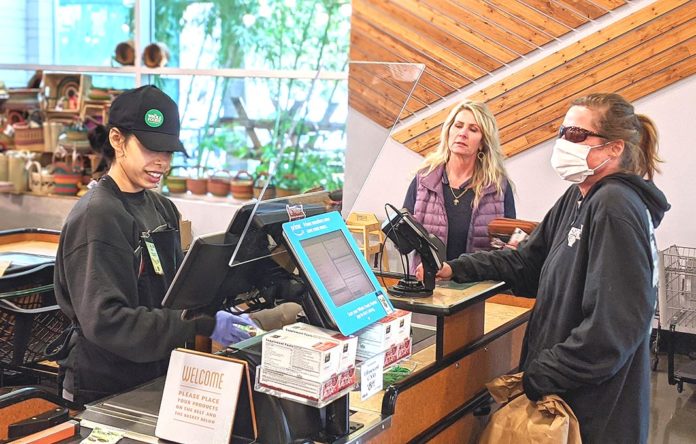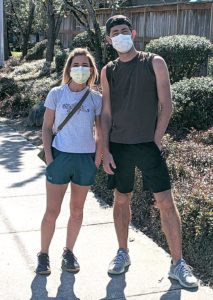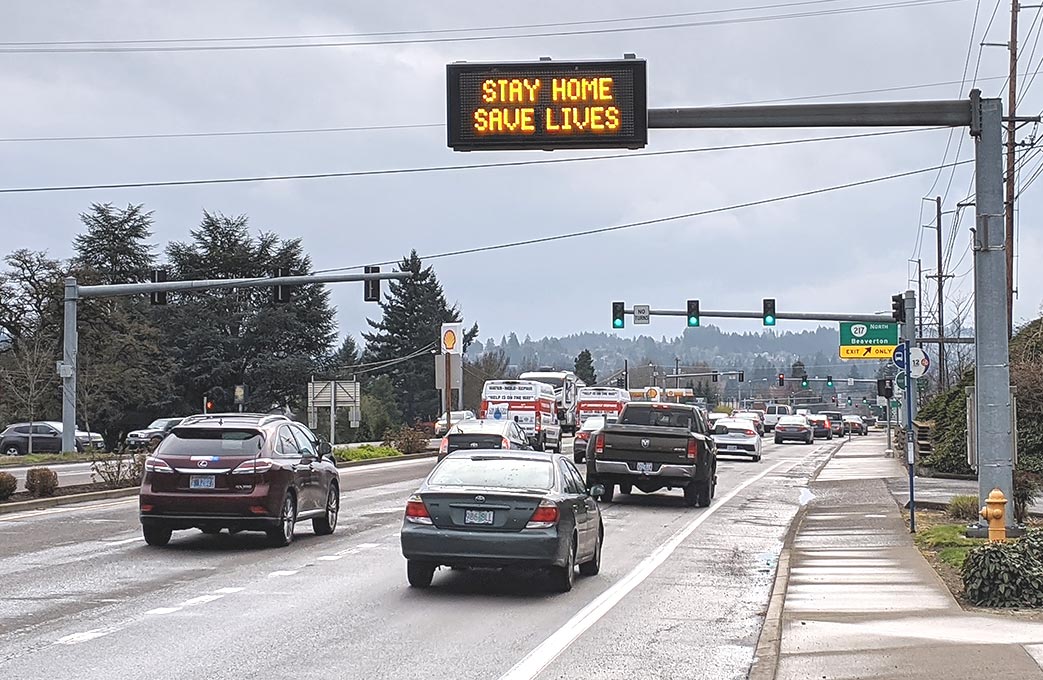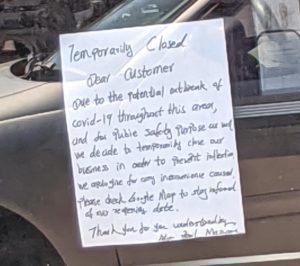
From Wuhan, China, where it originated in December, the coronavirus has quickly spread throughout the world, touching some 204 countries and territories, infecting about 1,080,000 people and causing some 58,000 deaths worldwide, as of Apr. 3. The World Health Organization declared the virus a pandemic on Mar. 11.
In the U.S., where President Trump declared a national emergency on Mar. 13, the virus and resulting disease, COVID-19, have appeared in all 50 states, Washington D.C., Puerto Rico, Guam and the US Virgin Islands. The Centers for Disease Control on Mar. 31 reported 163,539 cases in the U.S. and 2,860 deaths. Numbers are rising rapidly.
In addition to its toll on public health, the coronavirus pandemic has battered the global economy. In the U.S., stocks began to slump in late February. On Mar. 16, the Dow Jones Industrial Average had its highest percentage decline since 1987. The tumult in the markets continued through March, though late in the month some gains were made on news of a $2 trillion stimulus package that was signed by Trump on Mar. 27. Still, businesses large and small across all sectors are feeling the pain.
Oregon, as of Mar. 31, had 690 coronavirus cases and 18 deaths, according to the state health authority. Washington County had 186 cases, the most in the state, and three deaths. In an effort to slow the spread of the virus, Gov. Kate Brown, following the lead of other states, issued an indefinite statewide stay-home order that prohibits public and private gatherings, closed a variety of businesses and state parks, and established strict social distancing guidelines for businesses that remain open. Oregonians are discouraged from leaving their homes for anything but essential errands and exercise; and, in these cases, social distancing must be enforced. Violation of the order is a misdemeanor.
As the coronavirus situation has unfolded at the global, national and state levels, local governments, businesses and organizations also have been scrambling to adapt to life during a pandemic.

Tigard declares state of emergency
Mayor Jason Snider on Mar. 16 declared a local state of emergency in Tigard. The City Council passed a resolution ratifying that declaration during a meeting the following day.
The state of emergency, which is in effect until at least Apr. 30, allows the city to take “essentially any life, health, safety measure authorized by code or state law,” City Attorney Shelby Rihala said during the meeting.
Such measures, according to city code, could include establishing a curfew, prohibiting gatherings and suspending commercial activity, among others. The declaration resolution also allows the city manager to sign contracts without the standard review process, including construction contracts; temporarily waives utility late fees and shutoffs; and allows the city to relax code enforcement, such as parking restrictions for the duration of the emergency.
“If the emergency conditions improve before Apr. 30, the council could rescind the declaration,” Rihala said. Or, councilors could vote to extend it. Also, on Mar. 17, the City Council unanimously passed a resolution encouraging Gov. Brown to temporarily halt evictions statewide, which she did on Mar. 22. About 40 percent of Tigard’s households rent, according to the city, and 30 percent of those renters spend more than half of their income on rent.
“State action to prevent the loss of housing during this time of local and national emergency would provide our community with added security and help curtail the spread of the virus,” the city said in a statement.
Here’s how Tigard’s departments are being affected:

Tigard Public Library: Closed until further notice. Library users are asked not to return items while the library is closed; fines will not accrue during the closure. Items that are on hold will be available when the library re-opens. Library card accounts that are due to expire will be extended through Apr. 30. The library volunteer program is suspended until further notice.
Recreation: Tigard’s parks are open, but restrooms are locked and playgrounds, play equipment and sports courts are off-limits. Social distancing at parks is required. Shelter reservations for April, May and June are not being accepted. All recreation events are canceled through Apr. 30.
Planning, permitting and building: The permit center counter is closed. Staff is completing permits, planning applications and design reviews online, by phone and drop box only.
Municipal Court: The court counters are closed, and court appearances are being rescheduled for May. Court clerks are available by phone and email: 503-718-2478; court1@tigard-or.gov. For information about online payments, go to the city website: www.tigard-or.gov.
Schools closed through April
Tigard-Tualatin School District directors voted unanimously Mar. 12 to close schools through Mar. 31. That same night, Gov. Kate Brown announced that schools statewide would be closed through the end of March. On Mar. 17, Brown extended the school closure to Apr. 28.
Many states across the country have closed schools for various amounts of time. President Trump during a Mar. 20 press conference announced that federally mandated standardized tests for this year would be canceled.
TTSD announced that to-go breakfast and lunch will be available to students who are part of the district’s free and reduced meal program. The meal service was halted during spring break and was set to resume Mar. 30. Meals will be available Monday through Friday from 10:30 a.m. – 12:30 p.m. at Metzger Elementary (10350 Lincoln St., Tigard) and Tualatin Elementary (20405 SW 95th Ave., Tualatin).
First responders seek to limit contact
While many people are staying home as much as possible, local police and fire personnel don’t have that option. But agencies are taking precautions to keep first responders, and those who support them, safe.
The Tualatin Police Department is trying to limit in-person contact between officers and staff and the public as much as possible, spokesman Nate Cooper said.
“In our line of work that is not always possible, and we realize we still need to respond to emergency calls for service in person. As a result, we do have person-to-person contact with the public,” he said. “However, when it is reasonable to make a phone call in a non-emergency situation we are asking our officers to do so.”
Within the department building itself, which is closed to the public, officers and staff are practicing social distancing and being asked to avoid the building unless they must be there, he said.
Tigard police spokeswoman Stefanie Kouremetis said that her department is taking similar precautions.
Tualatin Valley Fire & Rescue said in a statement that it is working with local health departments and state agencies to ensure service can continue and personnel remain safe. Measures include updated protocols for 911 operators, refreshed training for the use of personal protective gear and other strategies, such as event cancelations, to limit potential exposure to the coronavirus.

Community comes together to help
During this challenging time, many people and organizations are doing what they can to help.
For instance, Rose City Distilling, which is located in Tigard, has been using its raw materials to make and bottle hand sanitizer and then donating it to local police departments, including Tigard and Tualatin.
As of Mar. 20, Rose City had given out 400 bottles of sanitizer, according to Chief Operations Officer Cam Werschkul, with plans to ramp up production to 1,000 bottles per day.
“Hand sanitizer is primarily raw alcohol, and being a large-scale distiller we certainly have copious amounts of raw alcohol,” he said. In addition to alcohol, Rose City’s hand sanitizer contains a couple of other ingredients, including a food additive that gives the sanitizer a blue color.
Werschkul said that other, smaller distilleries started producing hand sanitizer for use in their tasting rooms, inspiring Rose City to mass-produce sanitizer and donate it to first responders. Distillers across the nation have followed suit.
“For us, it was a no-brainer,” he said. “Our director of retail sales is an Army veteran and it was actually his idea to get it to the people who need it most, which are the first responders.”
Tigard Police Chief Kathy McAlpine expressed her gratitude via social media.
“You have no idea how much this means to us,” she said in a Mar. 19 tweet. “We are out and about contacting people because it is our job, and we sanitize after each call. So this helps.”
The Tualatin Police Department received donated N95 face masks from Ffosil Contracting. The department’s community services officer heard on the radio that the Silverton-based firm wanted to donate masks to first responders and called them, Tualatin police spokesman Nate Cooper said.
“They were gracious enough to donate enough masks that each officer now has one,” he said. “We greatly appreciate them for helping us out as it is extremely difficult for us to obtain personal protective equipment during these times.”
“n Tigard, the Bethlehem House of Bread received 90 cases of oatmeal originally meant for Portland’s Shamrock Run, which was canceled due to the pandemic, pantry volunteer Erin Fitzgerald said.
“Thank you to the race organizers and DeAngelo’s Catering & Events for making it happen,” she said.
That food pantry is classified as an essential service and was remaining open, according to a Mar. 26 Facebook post, with social distancing being incorporated into the food pickup process.
Local business face the challenge
With the suspension of dine-in service at the state’s bars and restaurants, prohibition of gatherings and closure of businesses deemed nonessential, local businesses and organizations are getting hit hard.

Many local establishments have scrambled to set up or increase take-out dining operations. Among them is Aloha Grill in Tualatin, which has stayed open for carry-out and delivery orders.
“It’s been better than what I thought,” owner Dave Quinn said on Mar. 23. But, he added, “sales are down about 30 percent compared to normal.”
Still, he said he was keeping his staff of nine employees working, but at reduced hours.
Burgerville, which has two stores in Tigard, announced Mar. 23 that it would furlough 68 percent of its workforce – about 1,000 employees, according to reports. The company also is temporarily closing its Burgerville Signature location on Scholls Ferry Road in Tigard, according to a statement from CEO Jill Taylor.
Other restaurants and bars have decided to temporarily close altogether. Tualatin’s CI Bar & Grill posted on its Facebook page that it would not be open for take-out and delivery during the ongoing suspension of dine-in service. The bar has set up a GoFundMe page to raise money for its servers, bartenders and kitchen crew. See its Facebook page (facebook.com/TheCIBarAndGrill) for more information.
“The impact across the business community is pretty broad and deep,” Tigard Chamber of Commerce CEO Debi Mollahan said on Mar. 25, adding that some 80 percent of her organization’s member businesses are deemed nonessential under Gov. Brown’s stay-home order.
Right now the chamber is working to help its member businesses adapt to the ever-changing situation. That includes everything to helping members figure out how to modify their business models to stay operating under the new pandemic-related regulations and identifying local, state and federal resources as they come available.
“We’re just trying to make sure that the business community is informed and advocate for them at all levels,” she said.
In Tualatin, the City Council voted Mar. 23 to establish a $250,000 economic stabilization fund to provide grants of up to $10,000 to small businesses in the city. Some 20 percent of Tualatin’s workforce is employed in the hospitality and retail business, according to the city. Grant applications were due by Mar. 31.
Local entertainment businesses also are being pummeled.
Earlier in March, Joy Cinema in Tigard announced on its website that it was temporarily closing.
“But we’ll be back at it,” the theater said in a Mar. 17 Facebook post. “Never you fear.”

The Mask & Mirror Community Theatre, which stages productions in Tigard and Tualatin, has canceled current shows, said Gary Romans, a Tigard resident who founded the all-volunteer theatre group.
“The big issue is uncertainty,” he said. “We have shows planned for May and July. We are unsure how to proceed. When we do decide to proceed, when will our audience return?”
Broadway Rose Theatre Company, located in Tigard, faces a similar situation. It has had to cancel a production of “Ain’t Misbehavin,’” said Managing Director Dan Murphy. On the bright side, the majority of the 4,400 ticket holders for that show donated the cost of their tickets, rather than request a refund or voucher for a future show.
“The financial loss after canceling a show is significant, and the support and generosity of our loyal patrons has been very meaningful to us,” he said.
Right now, Murphy said, the organization is doing its best to keep its staff busy so the theatre can bounce back when the pandemic passes.
“It’s hard to plan for the future,” he said. “We’ll just take it one day at a time.”
While the impact on hospitality, retail and entertainment have been front and center, the effects of the pandemic have touched all sectors.
Robert Kellogg, an attorney who also serves on the Tualatin City Council, said coronavirus has forced him to alter how he interacts with clients and conducts business – for instance, the signing of estate planning documents, which requires witnesses and a notary.
Kellogg’s office has incorporated social distancing into the process, with witnesses watching from a window into a conference room as Kellogg and the notary wear gloves and masks while handling documents.
For his practice’s business clients, “It has been a five-alarm fire,” Kellogg said, as they deal with “economic uncertainty and associated loss of revenue while trying to keep employees safe by hurriedly implementing policies and infrastructure for remote working by their entire workforce.”
The real estate industry also is adapting to social distancing mandates as houses continue to be bought and sold, said Amy Savage of Tualatin-based A Group Realty.
Only essential tasks are done in person, she said, adding that, “Open houses have ceased. Video, FaceTime and Zoom calls are being encouraged and can be very effective.”
As for long-term effects on the local real estate market, Savage said it’s too early to tell.
“The market hasn’t had time to fully react to the COVID-19 pandemic,” she said. “We will continue to do everything we can to successfully keep the real estate market strong and moving forward in a positive way.”
Coronavirus strains healthcare systems
The coronavirus has strained the medical infrastructure across the world. Locally, hospitals and medical offices are taking precautions to brace for an anticipated increase in coronavirus cases.
Legacy Health, which has a hospital in Tualatin, has postponed non-urgent surgeries, procedures and well visits. Other area hospitals, medical and dental offices have taken similar measures.
Dr. Jeff Clark of True Health Medicine in Tualatin said his practice, and others, are offering telemedicine video appointments. It’s an option that allows people – often those with chronic conditions – to stay at home and avoid possible exposure to coronavirus or the flu.
“A lot of primary care medicine doesn’t need to be done in person,” he said.
For people who want to reduce their risk of contracting the coronavirus, Clark recommends following widely publicized precautions, such as social distancing and washing their hands with soap and water. He cautioned against the overuse of hand sanitizers and harsh sops, saying they will cause skin problems in the long run. Also, he noted the importance of good nutrition and rest to keep the body’s immune system strong.
“People should be careful. They shouldn’t be panicking,” he said. “The first thing is: Don’t stress out. Most people are going to be fine.”
Senior communities take precautions
Older people and those with weakened immune systems are most vulnerable to serious coronavirus complications, according to reports. Locally, senior communities are taking precautions to keep their residents safe.
In a Mar. 20 statement, King City Senior Village said staff is following CDC guidelines on coronavirus and taking additional steps.
One of those measures is the use of the community’s outlying cottages as intermediary homes for residents who are currently moving into the senior village. Upon move-in, a new resident spends an observation period in a cottage. Once they have been virus-free for two weeks, they are able to move into the main building.
The facility also taking temperatures daily, practicing social distancing among residents and limiting outside visitors. To that end, it recommends people use technology, such as Skype and FaceTime, to maintain contact with residents.
With gatherings banned, local churches adapt
Gov. Brown’s stay-home order, which prohibits social gatherings outside of households, has prompted local churches to suspend services and other events. However many houses of worship are using their websites and social media to communicate with parishioners and stream church services.
Saint Anthony Catholic Church in Tigard, for instance, is streaming morning prayers and daily services of its Facebook page. Videos of Sunday Mass are also uploaded to the church website.
“I thought I would never become a televangelist,” said the Rev. John Henderson, pastor at the church, adding that virtual tools have maintained his connection with the St. Anthony congregation.
“One of the most important things for me as a pastor is that I am able to be connected with the people that I serve. That’s so important to me,” he said. “So I’m not going to let any closed door to a building hold us back from growing in our faith.”
Henderson noted that Holy Week, which culminates with Easter, is coming.
“And we’re going to be absent,” he said. “And that breaks my heart.”
But like other church services during this time of social distancing, parishioners will be able to watch St. Anthony’s Holy Week services online.
Check your church’s website and social media pages for more information about how they are adapting to social distancing.





















